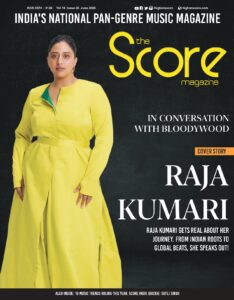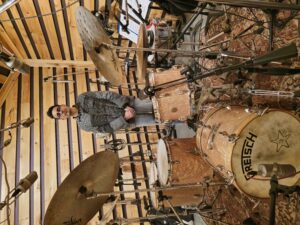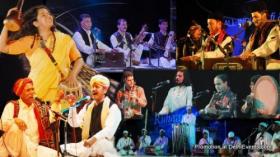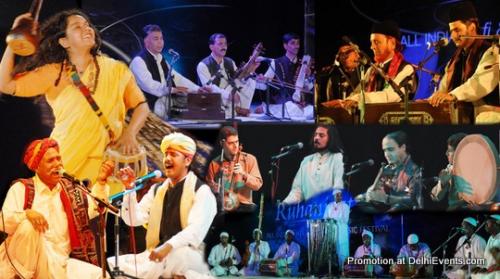
Striking, beating, swirling, singing, dancing, wading through the everyday chaos, the 6th edition of Ruhaniyat, Bengaluru called out to the connoisseurs of the city to join hands in a soulful trance on Dec 10, 2011, for a quiet Saturday evening at the Jayamahal Palace gardens.
With a spectacular line-up of rare art forms including Bharud and Abhang of Maharashtra, Sufiana Kalams from Kashmir, Sama from Turkey, Baul Songs from West Bengal, the evening truly was one of ibadat or a call to the supreme by his lover.
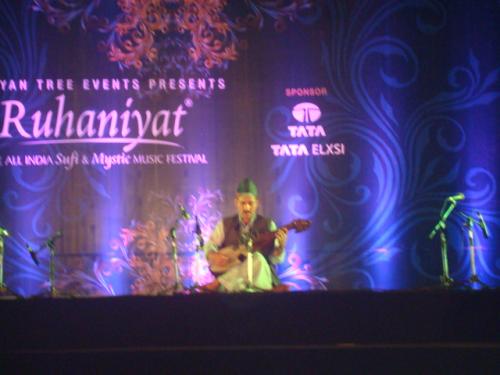
With the stage set under a clear night sky, the wheel of Ruhaniyat was set in motion with the mystic songs by Abdul Rashid Hafiz and his group. Setting the stage for India’s largest Sufi festival, their music slowly set the audience on a journey inward with the reigns in the hands of some unknown divine force. Leading them forward, Avdhoot Gandhi performed the Bharud & Abhang songs to the traditional Marathi beats. He stole the hearts of the audience with a special Gondhal performance in praise of Lord Vittal usually sung to bless the newly wed.
Soon Indra and Shakur Khan were blurring the boundaries of time and space with their Sufi Kalam, topped with a special Jugalbandhi to finish their performance. With over several generations and 100 years of the Khan’s family practicing the Sufi music in the Muslim Sufi tradition, their performance at the Bengaluru Habba even way back in 2008, had left the audience with a lasting impression. Ruhaniyat 2011, was no different. The rich music they had to offer reflected the spirit of the common man searching beyond the myriad facets of the daily life.
The journey reached its high point of culmination with the Baul songs performed by Parvathy Baul. Saffron clad, she sang and danced with an undoubted ambidextrous ease, strumming her Ek tara and striking her Duggi at the same time. Baul songs, a rather personal form of music or devotion emanated from the Bhakti movement and resonates spirituality in its true essence. And to watch someone on stage in such a holy trance, makes you wonder about the disconnect between the musician on that stage and the audience in their seats. Is it an art to be seen or experienced up that stage at all? That apart, Parvathy Baul self-trained in the Baul order, took her audience along as she swirled, singing and dancing in conversation with the divine one.
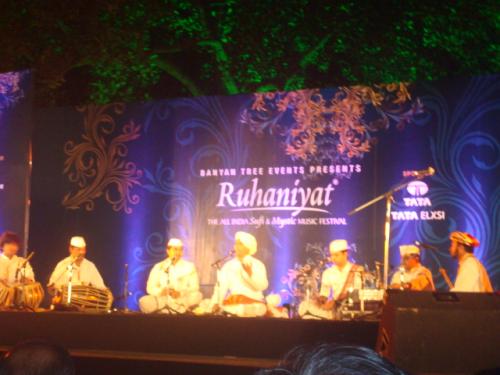
The swirling worship continued as the Whirling Dervishes from Turkey performed the holy Sama ceremony as still practiced by their Melvi order. The dervishes wore their traditional attire for this ritual – the white gown as symbol of death, a wide black cloak, hırka as symbol of the grave and a tall brown hat kûlah or sikke as symbol of the tombstone. After a solemn union with the divine, the second half of the show post the interval was a Sufi Qawwali treat for the audience by Shameem and Nayeem Ajmeri group. They sang a message of union going beyond manmade boundaries of religion with ‘Bharat me sukh ka vathavaran’ seeking a place without Hindu-Muslim or any religious divides saying that there is but one divine power. Qawwali being the art form in the line up with the largest following, Shameem and Nayeem Ajmeri left the audience pleading for one more. Though bound by time, the Master of Ceremony gave into the popular demand for one last take home performance from them.
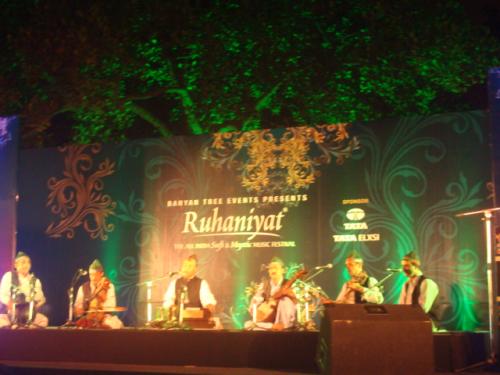
In essence, it was a beautiful evening of blissful music that finds its root in the soul of the common man. But what was it like to hear that music on stage inviting only the connoisseurs of Bangalore to be audience? So has this ‘once a common man’s cry’ today become the elite’s opera? Now that’s a debatable question. For what it’s worth, Ruhaniyat deserves applause for bringing some of the richest unknown traditions of the world packed well to suit a metro audience to meet a motif of oneness in the realm of spirituality. When asked about how the artists are chosen to perform, the Master of Ceremony for the evening Nandhini Mahesh said, “We bring in artists every year depending on what is needed for a particular city.” Ruhaniya began in 2001 conceived by Mahesh Babu, Banyan Tree Events in Mumbai. From an one city sojourn to a seven city caravan; this festival has come a long way with 11 glorious years of history and has now entered its second decade this year. Ruhaniyat was only the beginning. There’s more coming home to Bangalore this season from Banyan Tree Events. Watch out for their next edition of Splendour of Masters on January 26, 2012 at the Chowdiah Memorial Hall.
PHOTO CREDITS: Dushyanth




